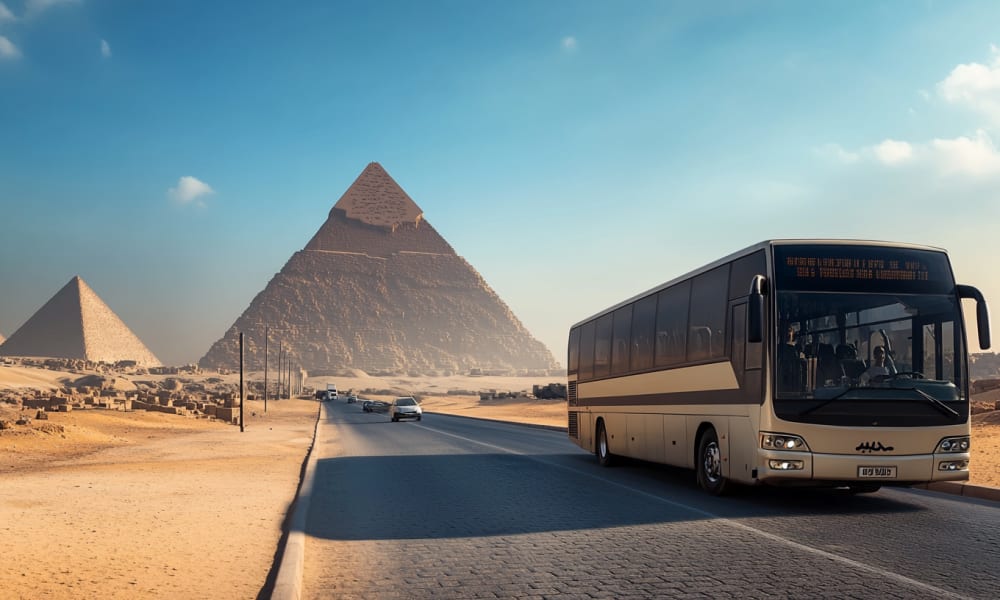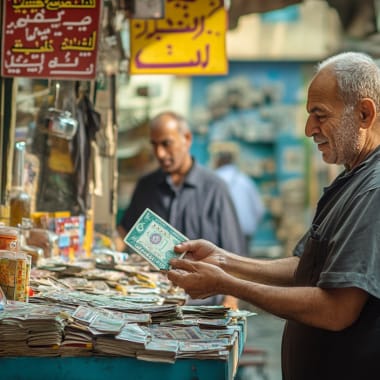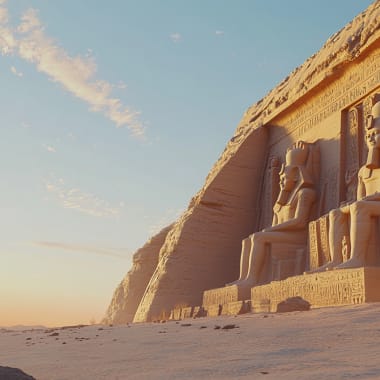
Transport options on site in Egypt
All means of transport for a safe and flexible trip through Egypt at a glance.
All means of transport for a safe and flexible trip through Egypt at a glance.
Whether it's a city trip, desert tour, or Nile cruise – those who want to discover Egypt individually face the question: How do I get safely and comfortably from A to B? The good news: the country offers a surprisingly wide range of means of transport that vary significantly in price, comfort, and user-friendliness. From modern long-distance buses to nostalgic trams to private transport services – there are suitable options for every travel profile.
Buses, trains, and domestic flights
For travel between cities, long-distance buses and trains are often the first choice. Providers like Go Bus or Blue Bus serve a dense network of comfortable, air-conditioned long-distance buses – ideal for popular routes like Cairo–Alexandria or Cairo–Hurghada. The Egyptian railway network is also reliable on major connections. Especially the express trains between Cairo and Alexandria offer travelers a safe and comfortable alternative to the road. Those who want to cover long distances quickly, such as to southern Luxor or Aswan, can also rely on domestic flights – usually well-timed and surprisingly affordable.
Taxis and rental cars
Within the cities, taxis are one of the most flexible means of transport. They are inexpensive and almost everywhere available – especially in metropolises like Cairo. Important: Before starting the ride, the price should be negotiated or a taxi meter should be used. For more comfort and planning security, booking through the hotel or via an app is recommended. Those wanting to cover greater distances or who value individual planning can also rely on private drivers or organized transfers. Rental cars, on the other hand, are only recommended for experienced drivers, as traffic in Egypt – especially in big cities – is considered chaotic and challenging.
Using taxis in Cairo
Taxis are as much a part of Cairo's cityscape as the pyramids are to Giza – they are ubiquitous, cheap, and flexible. However, tourists planning a taxi ride should prepare well, as not all taxis work the same way, and one should also be attentive to the price. There are significant differences between modern white taxis with a meter, older black-and-white models that require negotiation, and app-based rides like Uber or Careem.
Taxi meters and fair prices
The modern and most comfortable option for travelers is the white taxis with taxi meters. They usually have air conditioning and an official fare: a base fee of around €0.25, about €0.13–€0.25 per kilometer, plus a moderate charge for waiting times. In theory, the driver should turn on the meter at the beginning of the ride – in practice, this is not always done. Therefore, kindly but firmly insist on it. If this is refused, it is advisable to simply choose another taxi.
Alternatively, many locals and tourists use app services like Uber or Careem. These offer the advantage of fixed, transparent prices and the possibility of cashless payment – especially pleasant for those unfamiliar with the area. Older black-and-white taxis, on the other hand, usually drive without a meter, and negotiation skills are required here.
Negotiation tips
Anyone using a taxi without a meter should definitely negotiate the fare in advance. As a general rule: The better prepared you are, the lower the risk of being overcharged. Clearly state your destination and show – if necessary – the bill you are willing to pay. If the driver hesitates or quotes inflated prices, simply get into the next taxi.
Avoid getting into a taxi directly in front of hotels – tourist prices are often charged there. A short walk to the next side street can save you real money. Also, make sure to always have enough cash on hand, preferably in the right denominations. Card payments are rarely possible, and change is not always available.
For additional safety – especially at night or as a solo female traveler – app-based rides or taxis ordered through the hotel are recommended. For longer excursions, you can also rent a taxi for half a day or a whole day – it's important to clarify the route and price in advance.
Long-distance buses for longer routes
Long-distance buses are among the most popular means of transport for individual travelers who wish to explore Egypt comfortably and cost-effectively. Whether from bustling Cairo to the Red Sea or from the resort town of Hurghada to the cultural metropolis of Luxor – the well-developed long-distance bus network connects many tourist-relevant cities and offers a flexible alternative to train or plane.
Availability and booking
Two of the main providers are Go Bus and Blue Bus, both serving a wide route network. Connections like Cairo–Hurghada, Cairo–Sharm El-Sheikh, Hurghada–Luxor or Cairo–Alexandria are particularly frequently used. The buses operate during the day and at night, giving travelers a lot of flexibility. Tickets can be purchased either directly at the bus terminals – such as the Turgoman Terminal in Cairo – or conveniently online. Early reservation is strongly recommended, especially for night trips or during peak season, as seats on popular routes fill up quickly.
Safety and comfort
In terms of safety and equipment, especially Blue Bus and the premium lines of Go Bus perform very well. The vehicles are modern, air-conditioned, and often equipped with Wi-Fi, USB charging ports, entertainment systems, and comfortable seats. Blue Bus additionally offers included snacks, drinks, and generous legroom – ideal for longer routes like Cairo–Dahab or Marsa Alam. Those planning a night trip should choose a higher-class ticket to ensure comfort and quiet. Important: The actual travel time may vary depending on traffic and route – punctuality is not always guaranteed. For more predictability, checking current reviews can be helpful.
The railway network in Egypt
Those who wish to travel comfortably and authentically in Egypt should take a look at the railway network. Regular trains operate between the historical cities along the Nile, which are not only reliable and safe but also scenically beautiful. Particularly popular with tourists are the routes between Cairo, Luxor, and Aswan – as they connect important sights with comfortable travel.
Classes and services
Egypt's railway network offers various train types and classes for different requirements. Regular day trains usually have a simple second class and a more comfortable first class. However, particularly recommended for longer routes are the night trains with sleeping cars – for example, on the route from Cairo to Luxor or Aswan. These offer sleeper cars, dinner, and breakfast – turning the journey into a relaxing night trip with an experiential character. For those who prefer speed, express trains with fewer stops are especially operational between Cairo and Alexandria.
Ticket purchase and schedules
Train tickets can be conveniently purchased on-site at train stations, but it is recommended to book in advance, especially for sleeping cars and express trains – particularly during peak travel times. Those wishing to be on the safe side can have tickets reserved in advance through travel agencies or hotel services. The schedules are only limitedly available online, so inquiries at the station or with hotel staff can be helpful. Particularly pleasant: train stations are usually centrally located in the city – a clear advantage over airports, which often lie outside the city.
Domestic flight connections
For those who want to cover larger distances comfortably and time-efficiently in Egypt, domestic flights are a very attractive option. Especially when traveling between more remote locations like Cairo, Luxor, Aswan, or the beach resorts on the Red Sea, flights offer significant comfort and time advantages compared to train or bus. The well-developed network of national flight connections ensures that even remote travel destinations are reachable in a short time – a clear plus for individual travelers who want to travel flexibly and efficiently.
Important flight routes
The central hub for domestic flights is Cairo International Airport. Daily connections to important tourist destinations such as Hurghada, Sharm El-Sheikh, Luxor, and Aswan start from here. The transfer options in Hurghada and Sharm El-Sheikh are also ideal, especially if you want to combine the Red Sea with historical sites in the Nile Valley. For cultural trips, flights between Luxor and Aswan are popular, while the new connection via Sphinx International Airport near the pyramids offers a convenient alternative for visitors to Giza.
Booking and prices
Domestic flights can be easily booked online or directly on-site. The main airlines – Egyptair and Air Cairo – cover nearly the entire market. Ticket prices are in a moderate range: Depending on the route, booking time, and season, a one-way flight usually costs between 60 and 200 euros. Particularly on highly frequented routes, early booking is worthwhile to secure favorable rates. For those who prefer more comfort, business class options are also available on many routes – especially from Cairo, Hurghada, and Sharm El-Sheikh.
Rental cars and private drivers
For individual travelers who want to explore Egypt on their own, there are two particularly flexible options available: a rental car for self-use or a private driver with service. Both options offer a lot of mobility, but differ significantly in comfort, price structure, and legal requirements. The choice strongly depends on personal travel preferences and driving experience.
Providers and costs
Rental cars are available in Egypt from international and local providers and cost between 50 and 100 euros per day depending on the vehicle type and season – excluding insurance and possible additional fees for young drivers or extras such as GPS devices. Those who choose a rental car enjoy maximum independence but must navigate through often dense and confusing city traffic themselves.
Alternatively, private drivers can be booked for individual routes, day trips, or even entire tours. The price is usually flat and depends on distance, vehicle type, and duration. For example, a transfer from Luxor to Hurghada costs around 135 euros per vehicle – ideal for small groups or travelers who want to travel relaxed. In cities like Cairo, a driver can also be booked by the hour – a comfortable solution, especially for longer sightseeing days.
Safety and traffic regulations
Anyone driving themselves should prepare well for traffic in Egypt: In large cities, there is lively and often chaotic street traffic with little consideration, unclear traffic rules, and constant noise. This can be a real challenge for European drivers. On the highways, driving is often more pleasant – at least during the day. Night driving on remote roads, for instance between Luxor and Hurghada, is considered risky and should be avoided.
An international driving license is mandatory, as is the minimum age, which is usually 21 or 25 years. For driving in certain regions – such as through the desert or in Sinai – additional permits are required. Caution is also advised with insurance: The conditions vary widely, and comprehensive coverage with the lowest possible deductible is recommended.
Those who prefer to leave this responsibility to a professional are better advised with a private driver. This person knows the local conditions and also takes care of all the formalities. However, it is important to choose a reputable provider and agree on a fixed price in advance to avoid surprises. This makes traveling through Egypt not only more comfortable but also more relaxed.
Ferries and water transport
Also away from roads and railways, Egypt offers attractive opportunities to explore the country via water – whether by ferry connection on the Red Sea or on a leisurely ride over the Nile. For individual travelers, this not only opens up alternative routes but also very special travel experiences between land and water.
Ports and key destinations
The best-known ferry connection for tourists is the route between Hurghada and Sharm el-Sheikh – two popular beach destinations on the Red Sea. The crossing is offered several times a week and lasts about two and a half hours. International ferry connections, such as from Nuweiba or Taba to Aqaba in Jordan, are also popular with travelers wishing to bypass Israel by land. These routes are mainly operated by the company Arab Bridge Maritime. Those wanting to travel on the Nile can choose between various types of ships: from luxurious cruise ships to traditional feluccas, especially around Luxor and Aswan. Short sailing trips on a felucca at sunset are among the most atmospheric moments of any trip to Egypt.
Booking and safety precautions
Especially in the high season or on popular routes like Hurghada – Sharm el-Sheikh, early booking is recommended. Tickets are available online, directly from the ferry companies, or through local providers. It is also important to pay attention to current schedules and any changes – particularly for seasonal or international routes. Safety standards may vary depending on the provider and route. For safe travel, look for established companies with a good reputation and check reviews before booking. For international connections, be sure to allow enough time for customs and passport controls – don’t forget your passport and any necessary visas. Even though some ferries are relatively simply equipped, with good planning – and a few snacks brought along – any crossing can be enjoyed relaxed.
Discover the Orient with experts who have explored every corner themselves
Your dream holiday, tailor-made by experts.
We don't just know the Middle East from books, we visit the country several times a year to experience the culture, landscape and people first-hand.
From your first enquiry to your return home, we are there for you personally - by phone, email or WhatsApp, whenever you need us. Our trips are as unique as you are: individually planned and provided with exclusive privileges and high-quality arrangements that will make your trip unforgettable.
Experts for your Orient trip







